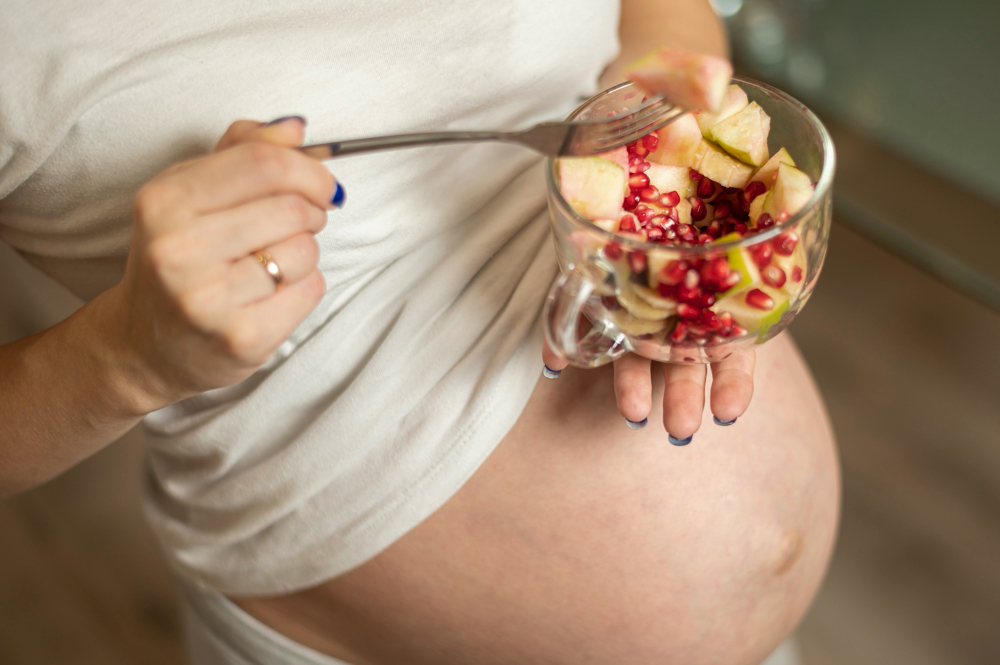- Fast results
- 4,000+ locations
- 4.8 star rating
Need Help? (888) GET LABS


The information in this article is not intended to replace professional medical advice, diagnosis, or treatment. Instead, consult your physician or any licensed healthcare providers if you have questions.
Urinary tract infection (UTI) during pregnancy is a common occurrence due to a combination of factors. This includes the physical and chemical changes a pregnant woman undergoes, which increases the proximity of exposure of the urinary tract to sources of infection.
However, UTI is not as inevitable as people assume. Plus, you can deal with UTI while pregnant by following conscious everyday choices and working closely with your gynecologist. Read on to learn these particular steps.
Hydration is an essential step in dealing with UTIs during pregnancy. Drinking the recommended water intake allows your bladder to release blood wastes, pushing disease-causing bacteria out of the urethra. In addition, water also dilutes urine and prevents the formation of kidney stones, which can exacerbate UTIs, especially among pregnant women.
Make sure to keep track of how much water you drink in a day. While eight to 10 glasses of water are the general recommendation, it’s still best to consult your doctor for the exact amount you need to hit.
Although the role of cranberry juice in helping treat UTIs remains debatable, scientific studies support the ability of cranberry juice to reduce the risks of UTIs. In a systematic review and meta-analysis published in PLoS One, it was highlighted that cranberry juice can lower the likelihood of UTIs among susceptible populations, including women.
Cranberry’s anti-adhesive properties influence its ability to prevent bacterial colonization in the urinary tract. However, the amount of cranberry juice and the duration of intake are some of the areas that need additional analysis. If you are apprehensive about drinking cranberry juice to help manage UTI, consult your doctor.
A cotton underwear is a breathable fabric that allows air circulation, which, in turn, prevents moisture buildup in your external genitalia. Keep in mind that moisture promotes bacterial growth. On the contrary, underwear made of synthetic material traps moisture and can be more irritating, aggravating UTI symptoms.
Frequent urination is common during pregnancy due to the added pressure on the bladder. This, of course, results from the inevitable rearrangement of the organs due to the growing fetus. However, as inconvenient as it could be, it’s important not to miss a bathroom trip if you need to urinate. Bacteria can multiply in the urinary tract if you hold your urine.
Cleansing your genitalia often just requires water. When you use harsh soaps and feminine products, there’s a good chance that the pH balance of the area will be altered, causing irritation and even inflammation in the urinary tract.
If you’re keen on using soap or feminine cleaning products, make sure you go for pH-balanced options. Still, it’s ideal to check with your doctor for personalized professional advice about the best hygienic practices.
Sexual activity increases your exposure to foreign microbes that can cause harm to your urinary tract and overturn the balance between good and bad bacteria. To prevent infection, the most practical thing you can do is to urinate, ideally before and after sex. Doing this allows you to flush out unwanted bacteria from your urethra, reducing your risks of developing UTIs.
However, urinating alone prior to and after sex is not foolproof. Hence, make sure you follow other tips covered above and below.
Bladder-irritating drinks are typically beverages that cause the bladder to work twice as hard or cause disruption in the bladder tissue. These include caffeinated drinks, alcohol, carbonated drinks, citrus juices, and artificially sweetened beverages.
For example, coffee, tea, and energy drinks are diuretic, which increases urine production. Coffee, in particular, can worsen urinary urgency and, in some cases, cause bladder pain. On the other hand, soda and sparkling water’s carbonation activity and acidity lead to bladder discomfort.
Keep in mind, however, that the impact of a specific drink may vary from person to person. You may not be as sensitive to these beverages as other people or vice versa. Nonetheless, it remains beneficial to limit your consumption of these drinks, and they can also cause other adverse effects on your general health.
After urinating, women should observe proper wiping, which specifically has to be from front to back. It also has to be one way instead of going back and forth. This prevents the spread of microbes from the anal region toward the vagina and urethra. In turn, this minimizes the risk of infection-causing bacteria localized in the anus to the urinary tract.

It’s estimated that between 20% to 30% of pregnant women experience urinary tract infection (UTI). This can be attributed to the physical and chemical changes that come with pregnancy.
For example, with the growing fetus in the uterus, your lower digestive tract and the urinary bladder shift and get pressed. As the bladder becomes squished, it triggers incontinence issues, which increases the likelihood of infection in that the leakage encourages bacterial growth.
In addition, the hormonal changes during pregnancy also contribute to UTI occurrences as they can impact urine flow. For example, the hormone relaxin causes muscle relaxation in the urinary tract, making it easier for bacteria to grow faster as urine moves slower.
The symptoms of UTI among pregnant women are not different from those of non-pregnant individuals. The intensity, however, may vary based on the severity of the infection. Nonetheless, watch out for these symptoms:
| Pro tip: Aside from physical discomfort, the state of your urine can reveal plenty about your health. Read our guides on what to look for when assessing your urine:What Does the Smell of Your Urine Tell You?What Color Should Urine Be and When to See a Doctor? |
If you do experience UTI symptoms, seek medical intervention to prevent the following complications:

A healthcare provider will assess your symptoms and perform a physical examination to check how they match those of urinary tract infection, such as pelvic pain, frequent and painful urination, and so on. Your medical history will also be checked, specifically, if you have a prior diagnosis of UTI or other infection. This helps in evaluating your overall risk for the condition.
You will also likely undergo urinalysis, wherein you’ll be asked to collect your urine sample to check the presence and quantity of white blood cells, bacteria, red blood cells, and other indicators of infection. In addition, a urine culture will also be performed to identify the specific bacteria causing the condition, which will be the primary basis for the course of treatment your doctor will prescribe.
| Pro tip: If your doctor requested a urinalysis, you can order the test online. Simply follow a few steps to create your account, locate a nearby testing partner, and start processing your order. |

There is already an increased risk of developing UTI during pregnancy due to the physical and chemical changes the mother undergoes during this time as the fetus grows and develops. There are some factors, however, that can trigger UTIs, such as a weak immune system, poor hygiene, unsafe sexual activity, and previous infections.
Pain and inflammation caused by UTI can impact your comfort and even your mobility. It’s best to assess the symptoms and go to the emergency room if the pain is intolerable so you can be given the right antibiotics and analgesics immediately. Home remedies such as cranberry juice and heating pads may not be sufficient or can only provide temporary relief.
Untreated UTIs can have adverse effects on the baby. For example, it can increase the likelihood of a preterm birth and low birth weight. This can be linked directly to the infection itself or due to complications like kidney damage and maternal high blood pressure, which leads to preeclampsia. In addition, if the UTI worsens, it can trigger sepsis, which can be life-threatening to both the mother and the baby.
UTI and pregnancy have a close connection due to the vulnerability of your bladder and urinary tract as a result of the organs’ shifting when the fetus starts to grow. However, keep in mind that you can prevent the infection by maintaining the recommended water intake, proper hygiene, and consistent consultation with your gynecologist. UTI is treatable and should not be taken for granted, as it could cause harm to your baby and your health. Make sure to work closely with your doctor to ensure optimum fetal and maternal health.

© Copyright 2025 Personalabs. All Rights Reserved.